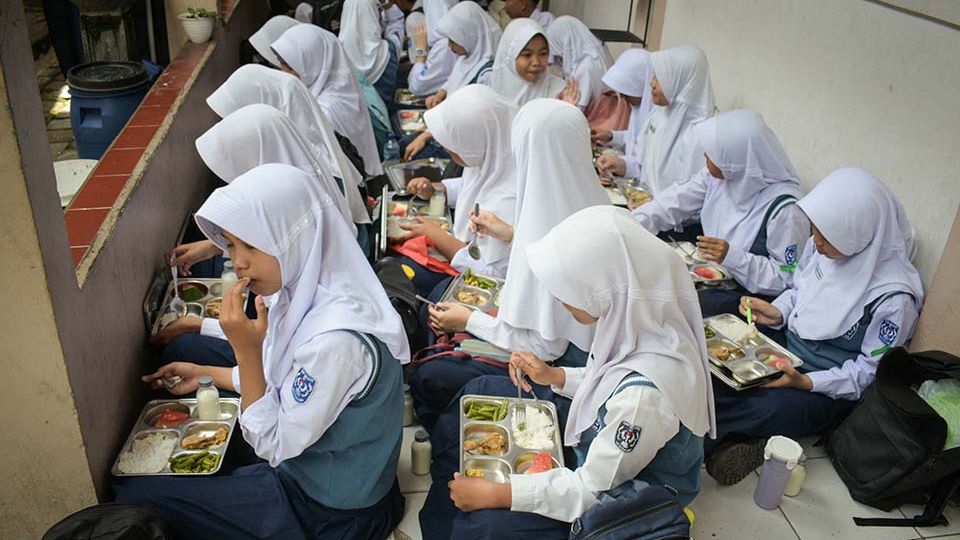April 29, 2025
JAKARTA – Almost four months into the rollout of the free nutritious meals program, President Prabowo Subianto recently boasted about its achievements, claiming that he had heard praise from officials in other countries about the initiative’s rapid expansion when compared to similar programs in other countries.
When the program was first launched on Jan. 6, it aimed to feed 600,000 recipients, mostly schoolchildren. The number gradually grew to 3 million recipients by April, before officials expanded the targeted population to 82.9 million students and pregnant women by the end of 2025.
But cracks have started to appear amid the rapid scaling up of President Prabowo’s flagship program, with the initiative meeting challenges from food poisoning and budgetary issues surrounding the kitchen providing the meal packages.
The expansion was followed by an increase in the number of food poisoning cases, which many blamed due to a lack of food quality control measures implemented by the thousands of food science and nutrition graduates recruited for the program.
One recent incident took place in Cianjur regency, West Java, where at least 165 students were admitted to the hospital for food poisoning after consuming the free meal packages.
The students came from two schools in the regency, namely MAN 1 Cianjur state Islamic senior high school and SMP PGRI 1 Cianjur junior high school. The high number of patients forced the regency administration to declare a state of emergency in the region.
The West Java Health Agency analyzed samples from the kitchen and vomit from the patients to check for possible microbe contamination, while the Cianjur Health Agency suspended meal production of the nutrition fulfilment service unit (SPPG) producing the meals, as reported by kompas.id on Saturday.
Calls for suspension
Aside from Cianjur, food poisoning cases allegedly caused by food distributed under the free meals program were recorded in other regions, including Bombana regency in Southeast Sulawesi and Batang in Central Java. The Cianjur case became the sixth known case of food poisoning since the program was launched in January.
Read also: Mass food poisoning incidents prompt call for free meals program evaluation
In response to the Cianjur case, National Nutrition Agency (BGN) head Dadan Hindayana said that the exact cause of the incident remained unclear and was still being investigated.
He asserted that the regency would require schools to hand over any food leftovers back to the source kitchens to ensure better hygiene.
“[We will] also be giving out training for food handlers to improve their skills and provide a refresher course at the same time,” Dadan told The Jakarta Post on Thursday.
After the Cianjur case made headlines, calls from civic organizations surfaced for the government to suspend the program, including from graft watchdog Indonesia Corruption Watch (ICW) which said that the incident was caused by a lack of standardization among all SPPG in preparing the food.
Diah Saminarsih of the Center for Indonesia’s Strategic Development Initiatives (CISDI) said that the food poisoning stemmed from the government’s failure to thoroughly consider conditions and other external factors that differ from one region to another.
“The government must at least review the program. Suspending it isn’t necessarily a bad idea,” Diah said. “If not, the issues must be categorized and solutions developed in consultation with experts and the public.”
Budgetary misuse concerns
The free meal program was also marred by alleged misappropriation of funds earmarked for the kitchens.
Read also: Jakarta free meal kitchen resumes operation despite funding shortage
Ira Mesra Destiawati, who owns an SPPG in South Jakarta, filed a report with the police on April 10 that the Media Berkat Nusantara (MBN) foundation, tasked with paying her kitchen using funds from the BGN, owed her nearly Rp 1 billion (US$59,400) in unpaid bills.
She agreed to resume her kitchen’s operation using her money and BGN funds following a mediation on April 16. But her lawyers are preparing to sue MBN for failing to follow up on the payments, as reported by kompas.com.
The case stoked public concern regarding alleged embezzlement of funds and lack of transparency surrounding the Rp 171 trillion project. A recent investigation by news magazine Tempo found that some foundations partnering with the BGN are linked to members of Prabowo’s inner circle.
To avoid similar incidents from happening, last week the nutrition agency changed its funding mechanism from a reimbursement scheme to paying kitchens in advance through a virtual account verified by the SPPG head and person in charge from partnering foundations.
Dadan said that around 900 kitchens had used the new payment mechanism, with the rest following soon.
But public policy expert Trubus Rahadiansyah said that the free meals program needed a “thorough reevaluation” to ensure every aspect of the initiative is managed more optimally under better oversight.
“The main problem facing the free meal program is mismanagement,” he said. “Since the program is funded by taxpayers’ money, any cash transfers to private parties must be made public.”
He also urged Prabowo’s administration to form a cross-ministerial task force to help and provide checks and balances on the BGN and its policies.


